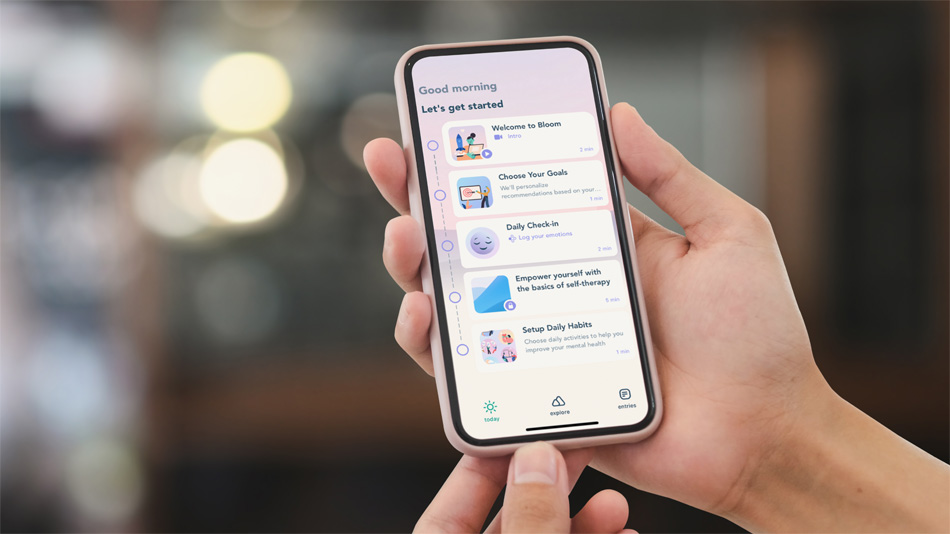How do we vet brands and products? Learn more.
The Bloom App Review: I Tested It Out for You
Finding the right app for your mental health needs can be difficult. Apps like Bloom aim to provide encouragement and motivation, but do they work?
Our everyday lives are full of stressors and challenges that can take a toll on our mental health, and thus, finding effective and affordable methods to improve our mental health has become increasingly important.
Being a medical doctor, I am fully aware of the importance of maintaining optimum mental health and its significant impact on our general well-being. In this digital era, technology is an important part of our lives, and making use of its potential to help us lead healthier lives is more beneficial than ever.
I recently came across the Bloom app, a self-guided therapy app praised for its ability to replace the need for a therapist.
Attracted by the idea of a thorough and user-friendly application that might help people improve their mental health, I decided to dig into the Bloom app.
Having had the chance to explore the app, I am excited to give an honest review about it. I’ll share everything you need to know about the Bloom app, including its features, benefits, and drawbacks.
What Is the Bloom App?

- You can learn cognitive behavioral therapy skills
- Several videos on improving anxiety and stress
- Daily guides for expressing inner thoughts
-
7-day free trial with a yearly subscription
-
A wide range of self-care techniques
-
Better for those who enjoy online therapy
-
CBT lessons are motivating and engaging
-
Guided video lessons for anxiety
-
Reports of bugs
-
The monthly subscription has no free trial
-
No licensed therapists available
Bloom is an interactive, self-guided app that focuses on personal therapy techniques. You can find features like journaling, video lessons, and breathing exercises to calm the mind. You can discover self-support methods that encourage more happiness and positivity, leading to a better quality of life.
With Bloom, you can focus more on your mental health rather than taking medication. It’s all about finding practical strategies that help you control your thoughts and feelings.
Simple things, like breathwork sessions and daily reminders, aim to reduce negative thoughts and symptoms of anxiety, depression, and other mental disorders. Bloom is supposed to improve your mental well-being using personalized programs.
Bloom also focuses on cognitive behavioral therapy (CBT) – a form of psychological treatment that challenges thoughts, beliefs, and attitudes. People can learn more about coping strategies and emotional regulation, influencing their behavior over time.
A study found that CBT effectively improves various mental health problems. These may be anxiety disorders, addictions, and depression. Most of all, CBT is a harmless way of changing your mindset to enforce better lifestyle habits.
If you want to exercise more, you could try daily activities to build consistent motivation. This will encourage small habits like morning walks and slow jogging. You just have to use the app every day to gain inspiration.
Why I Decided to Test the Bloom App
As a physician concerned about my well-being and that of my patients, I am constantly looking for efficient, accessible, and evidence-based tools to promote mental wellness. After observing the growing demand for mental health care and the barriers to accessing in-office therapy, I was intrigued by the possibilities of digital solutions like the Bloom app.
The decision to try it was influenced by several factors, such as the fact that it can be a convenient option for those who might be overwhelmed by the therapy process.
The privacy and convenience provided by self-guided therapy apps like Bloom also suit the requirements of those who might be reluctant to seek out traditional therapy due to stigma or time restraints.
The app’s reputation as one of the best self-guided mental health apps grabbed my attention even more. Its popularity among users looking to improve their mental well-being proved that it offered hope regarding effectiveness and user satisfaction.
In addition to being a doctor, I am a person who is on a journey toward balance and well-being. I have also experienced grief, anxiety, and depressive symptoms. The professionalism and high-quality care I received during those days were crucial to my recovery.
Since I know how therapy can contribute to someone’s healing, I have strong feelings about therapy services that fall short of giving quality care. And I wanted to know where Bloom stood in regards to that.
How I Started Out With the Bloom App
The Bloom experience starts with a simple sign-up process. After downloading the app from the App Store, I gave the necessary details to create an account.
After that, the app prompted me to complete a personalized quiz to customize the experience to my needs and preferences. You can also do the quiz from the website without downloading the app.
The quiz covers various mental health topics, such as stress levels, sleep patterns, emotional well-being, and personal goals. It captured a full picture of my current mental state and goals to create a personalized program for me. The app also wanted to know how familiar I was with CBT.
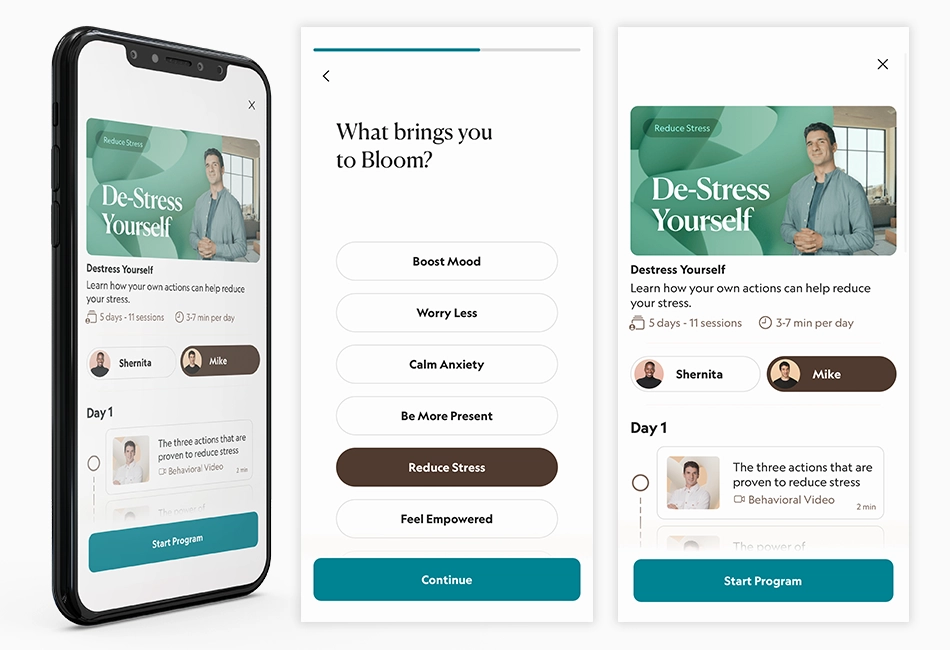
During the quiz, I selected variables relevant to my current situation and needs. This included managing work-related stress and improving sleep quality and mood.
The app created a full report outlining my strengths, areas for improvement, and suggested exercises.
To test out this app, I started with the free trial, which allowed me to enjoy the journal feature of the app. The premium version of the app offers CBT guides and video therapy sessions. Bloom allows its users to try the premium version for seven days before charging them.
How Does the Bloom App Work? 5 Key Features
Bloom offers various features designed to support mental well-being and personal growth. If you’re thinking about exploring it, here are the key features you can look forward to:
#1 Daily journaling
There are 4 journals you can write in when using the app. These include gratitude, daily intention, and morning and evening journals. Documenting your thoughts is supposed to be a pleasant and uplifting treatment for mental health conditions.
I found daily journaling to be an effective strategy for improving mental health. This tool allows me to express my thoughts in a safe and confidential environment. Writing down my thoughts, as prompted by the app, gave me a sense of release and clarity that improved my general mental state.
#2 Mindfulness exercises
Bloom has mini-lessons that focus on opening your mind.
They could be centered around quotes, mantras, or personal subjects. It only took me a few minutes to complete each mindfulness exercise.
I understand the scientifically proven benefits of mindfulness in stress reduction and overall mental health. Exploring these exercises on Bloom was enlightening and underlined the necessity of mindfulness in managing the demands of a busy life.
#3 Video therapy sessions
The huge library of video therapy sessions is one of the main selling points of the Bloom app.
The pre-recorded clips range from “Learning to Love Yourself” and “Mastering Life Changes” to chronic stress, anxiety, and low self-esteem. Whatever your current challenge is, you can be confident that there will be a quick session to address it.
The video sessions are interactive, but not in the sense that someone is talking to you in real-time; rather, questions are placed between them. For example, I had a therapist discussing ways to build resilience, and I was asked to write quickly about a time when I felt I needed to be strong or could have been more resilient.
#4 Quick daily activities
The Bloom app offers various “Quick & Easy” activities found on the home screen. They include things like breathing exercises, gratitude exercises, and goal-setting. You can engage in these activities as often as you please. So, when you have a moment to spare at the bus stop, checking in with yourself is simple.
I took a quick look at each one, and what stood out for me were the “Self Affirmation” exercise, which asks you to list positive qualities about yourself, and the “Intention Setting” exercise, which is great for starting your morning.
You can also expect to get quick pep talks from your virtual therapist. These under-minute-long clips give you a quick approach to confronting any negative self-talk or thoughts you might be having. I imagine it as a quick chat when I need it most.
Bloom also sends you daily reminders to help you stay on track with your daily activities. For example, if you haven’t completed any breathing exercises during the day, Bloom will send a quick alert to your phone.
#5 Sleep section
One of the best features of Bloom is the sleep section. There are tools, like nature sounds and guided meditations, that promote a better night’s sleep for users. You can also listen to calming music that aims to soothe your mind and clear bad thoughts.
I found this section incredibly helpful, as it offers valuable insights on creating a bedtime routine that promotes sleep and overall mental and emotional rejuvenation.
What I Liked About the Bloom App: 4 Key Benefits
Bloom offers various benefits that cover different personalized needs and preferences. Here’s how I benefited from the app.
#1 You can do your therapy in private
Bloom ensures 100% anonymity. You don’t require office visits or disclose every detail about yourself; you can do everything yourself and complete the therapy whenever you want and need it most. There is also zero likelihood that you will ever run into someone you know.
The flexibility to engage in therapy when it’s most convenient and relevant during my quiet evenings stood out.
#2 It’s based on CBT
Bloom uses CBT-based techniques supported by science to promote mindfulness and relaxation. CBT is effective in reducing the symptoms of anxiety and any other mental illness.
Bloom explains the CBT terms and activities in a detailed and easy-to-understand way, making it suitable for beginners to CBT skills.
These mindset-focused tools can change how you think to make long-lasting, positive changes to manage your anxiety.
I noticed positive effects on my behavior, thought patterns, and sleep quality, even when I had only tried the free trial.
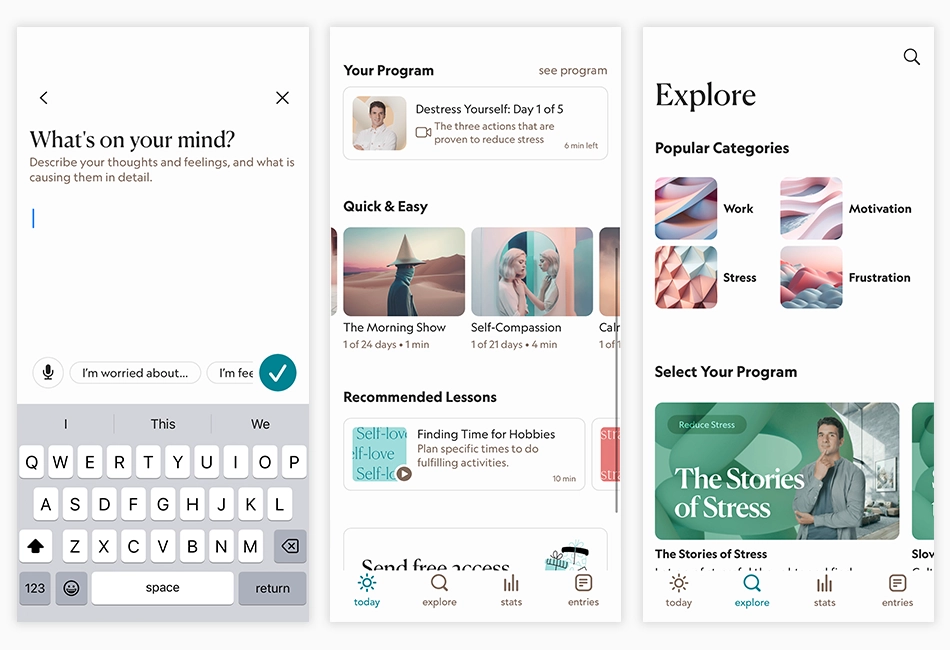
#3 It doesn’t require a lot of investment
In-office therapy sessions can be expensive. You also need to attend several monthly sessions, which increases the cost. The high cost of therapy may discourage some people from receiving the care they need.
Bloom costs less than traditional therapy sessions and offers a free trial. I started with a free trial, which immediately impressed me with its accessible approach.
#4 It’s easy to use and encouraging
Bloom was easy to use and navigate. It was also simple to start with, thanks to its user-friendly layout, simple instructions, and simple design.
The app also has an encouraging nature – whether through daily reminders, inspirational pep talks, or progress tracking, which kept me interested and inspired me to continue my journey toward mental wellness.
What I Didn’t Like About the Bloom App
While Bloom offers several valuable features, I experienced some drawbacks. Here is what I found less appealing, along with suggestions for improvements:
#1 It takes time to notice a difference
One of the downsides I encountered while using Bloom is that it lacks accountability, takes time to notice the difference, and requires personal commitment to see significant progress.
If you’re looking for in-person therapy, platforms like Talkspace or BetterHelp provide direct interaction with mental health professionals, providing quicker feedback and accountability for progress.
#2 The app is buggy and crashes often
Bloom was buggy for me, crashing frequently, even when connected to wifi. This may contribute to other issues, such as automatic subscription charges. Bloom is also not yet available on Android, and while it’s coming soon, it can limit many who can benefit from it.
Developers at Bloom should ensure consistent app performance through thorough testing and frequent updates to improve user satisfaction.
#3 There’s an age restriction to use it
Bloom states that you must be at least 13 years old to use it and at least 18 years old to buy a subscription. This may limit a group of people who may benefit from its resources.
Widening the app’s age limit while still offering appropriate content will allow more people to access its helpful mental health tools.
How Much Does the Bloom App Cost?
Bloom Premium costs $14.49 per month, $59.99 per year, or $399.99 for a lifetime subscription.
You can also try the free version to form an opinion. However, the features are limited compared to a premium subscription, but they could still be helpful. Daily tools, like journals and mindfulness exercises, can be a part of your calming routine.
User Reviews of the Bloom App
Many users praise the app’s accessibility and convenience, noting how much they enjoy engaging in self-guided therapy at their own pace and in their settings.
Other users speak highly of the effectiveness of the app’s mindfulness exercises and cognitive behavioral therapy methods for reducing stress and anxiety. Some users also mention the app’s personalized approach, with specific exercises and advice tailored to their unique preferences and needs.
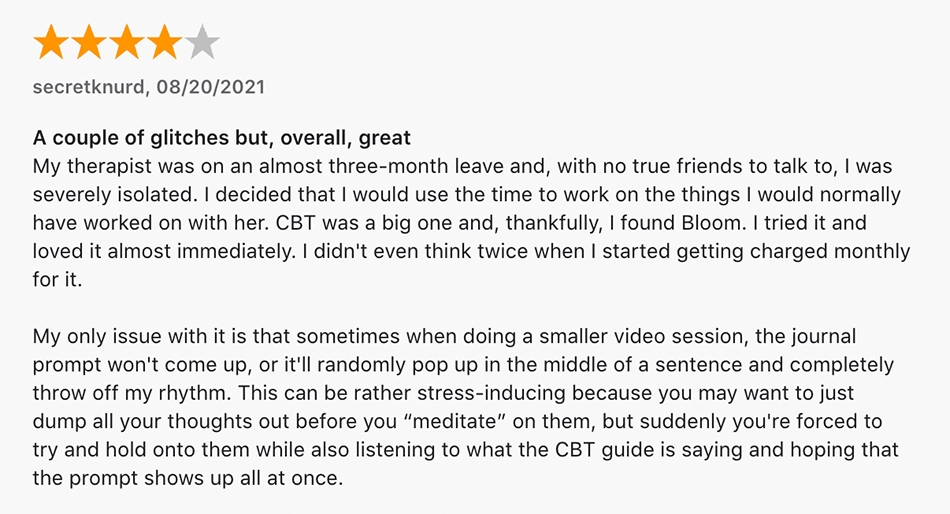
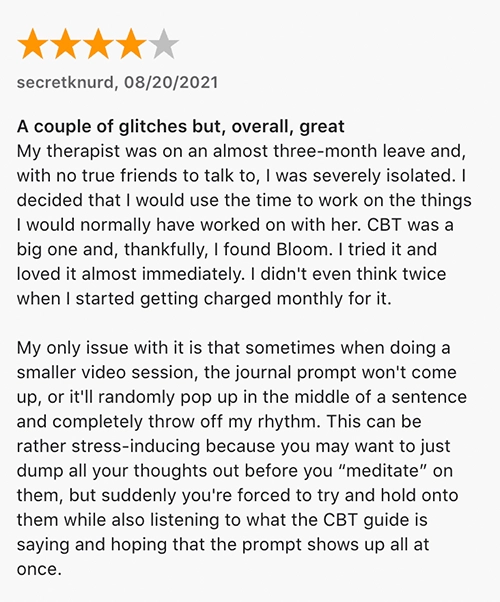
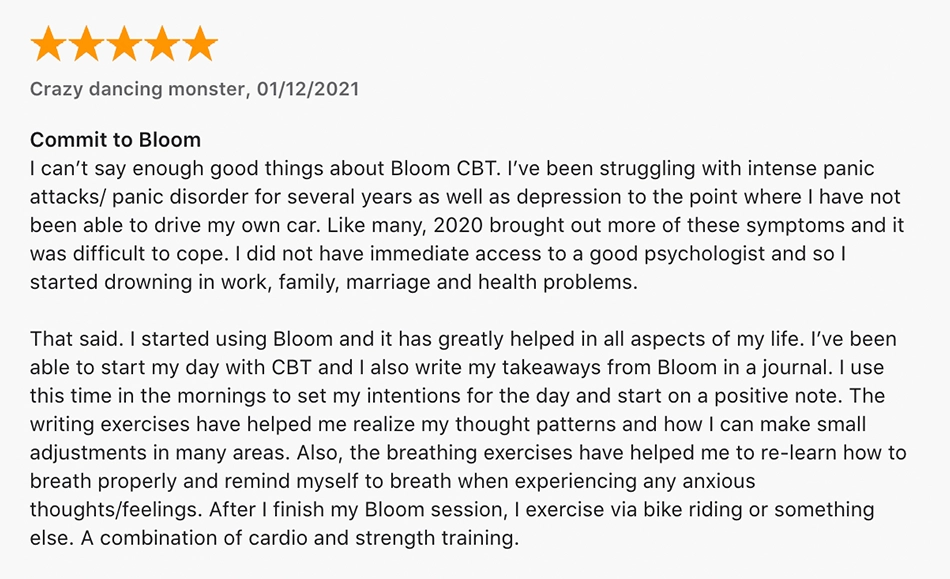
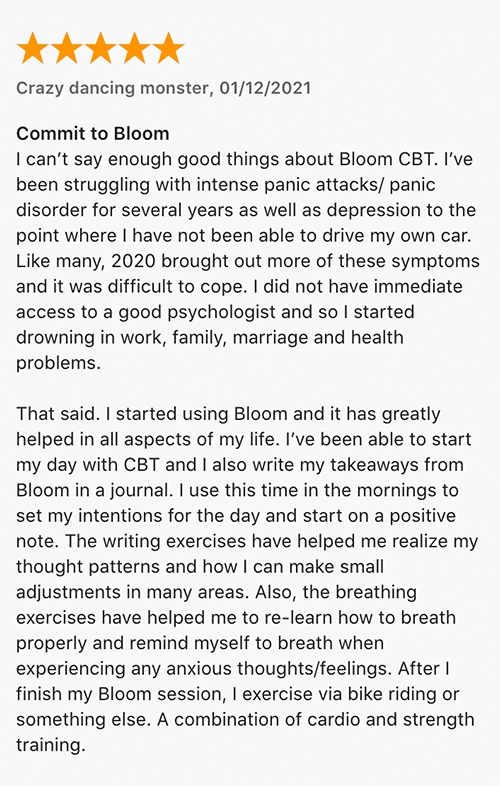
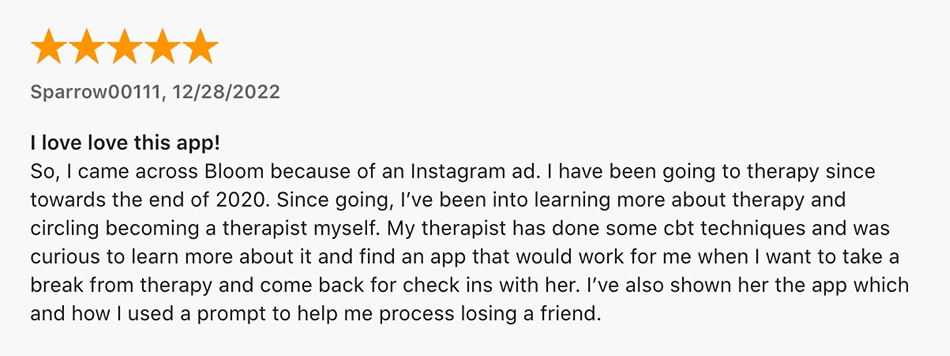
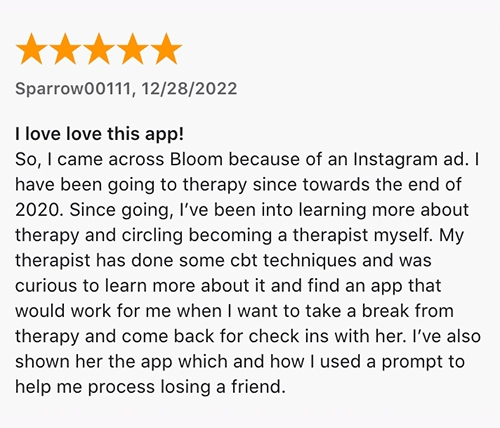
While many users praised the app, a few complained about its occasional technical issues, such as crashes and bugs. Others noted that it took them some time to observe tangible results, while others needed the app to expand the age limit of users to accommodate all age groups.
The Bloom App vs. the Alternatives




Educational reading material
Quick-relief exercises
Mood journaling to track different emotions
Daily guidance for self-care
You can complete weekly tests for in-depth anxiety and depression monitoring
An 84-day course for self-management
People can gain motivation from CBT lessons
7-day free trial for a yearly subscription
Self-care techniques for anxiety symptoms
Lots of calming video lessons
Suitable for those who don’t like in-person therapy
Easy-to-use interface
Constantly updated with new content
Adjustable nature sounds
Lots of sleep stories for adults and children
Calming voices in the videos
The matching process is very quick
You can text your therapist at any time
Several counseling options for couples and teenagers
Beginner-friendly features
No time commitment
Paid app
Some content might be overwhelming
Buggy app
No free trial for the monthly subscription
A licensed therapist is not available
The daily reminders aren’t convincing enough
A lack of unique meditation techniques
Stories can be too long
You can’t choose your own therapists
No insurance available
A lack of video sessions and messages from some therapists
How I Tested Bloom
Pre-testing of an application ensures that the features are of the highest quality. Before fully committing to Bloom, I put it through a thorough testing process to evaluate its quality, effectiveness, price, and brand reputation. This ensured that the app met my standards for promoting mental wellness.
Quality 8/10
I examined the Bloom app’s features and functionalities to determine its quality. I found Bloom to have high-quality features that positively impact my daily life. Interactive mood journals can benefit those who don’t want an actual therapist. Mindfulness apps with excellent features are more likely to help people with mental illness.
While these features can be beneficial to many, the app’s bugs and crashes can be discouraging when using the app.
Effectiveness 8/10
To evaluate the app’s effectiveness, I engaged with it for some time, exploring its activities and following the recommended practices. The app impacted my mood, stress levels, and overall mental health.
Bloom also uses CBT guides that are proven by science to promote mental well-being.
To reap more from Bloom, however, you must pay for a Bloom subscription, which offers features with detailed expert information and simple exercises, like journaling and breathing techniques, to help keep you on top of your mental health.
Price 7/10
Therapy is costly. Comparing Bloom’s price with the cost of seeing a traditional therapist, Bloom offers a more budget-friendly alternative.
While not everyone can afford Bloom’s subscription, many can get the mental health support they need without digging deeper into their pockets.
Brand reputation 9/10
Bloom wants to help people “improve how they think and act” when trying the app’s features. They care about making a positive change in today’s wellness industry. Brands that put customers first when designing products are bound to have a high score. I also found Bloom to have positive ratings, which pulled me even more into trying the app.
FAQs
Yes, Bloom is safe for people who want to manage their mental health. The information is both factual and educational. If you don’t see any emotional changes when using the app, consider talking to your doctor for further personal guidance.
Bloom is worth it for people who need self-care techniques. There are plenty of videos, CBT lessons, and guides for expressing your emotions. Just remember that everyone has a unique experience, so it’s worth trying the free trial features.
You can get a 7-day free trial before purchasing a yearly subscription. However, you cannot get a trial when looking at monthly memberships. This is something to consider before committing and spending your money for those 12 months.
No, Bloom doesn’t currently take insurance. This means you can’t earn money back from damage or other qualified reasons. Some people may only feel comfortable with apps that provide insurance, so it’s a drawback to remember before purchasing.
You can find and download the Bloom app from the App Store if you’re using an iOS device, such as an iPhone or iPad. The direct link can be found on the official website.
A Word From RD
Certain apps might claim to support mental health issues. However, not all of them care about customers in the long term. Therefore, you could do more research on the chosen brand to determine its overall mission and whether customers are the top priority.
Learning about meditation techniques from other meditation apps will also boost your mental health. You could go for long-distance runs, connect with friends, and try yoga sessions. Apps are great for building a routine at home, but you still need to make healthy lifestyle changes.
Those with current health conditions can still speak to a doctor about seeking in-person therapy. Speaking to a professional could help you discover a more suitable treatment. Just remember that therapists are there to offer guidance and expert advice.
Final Verdict: Is the Bloom App Worth It?
The Bloom app can be a potential and valuable self-guided therapy app that you can integrate into your daily life to help improve your mental well-being. This is especially true if you value self-guided therapy, convenience, and privacy. Its personalized approach and CBT guides are notable benefits.
However, it might not fully meet your needs if you seek immediate guidance, prefer more interactive therapy, or are outside the app’s age restriction.
You may consider taking advantage of Bloom’s free trials to determine if the app is right for you. If it doesn’t align with your needs, you can try other mental health apps, such as Sensa or Headspace. These apps tailor their features to your needs to help you focus more on growing your confidence and overall well-being.

















































 Select your language:
Select your language: 



